Iowa soybean farmers feeling the heat of tariffs
Federal aid will offset the costs of China tariffs for farmers this season, but continued low demand could be a cause for concern in future years.
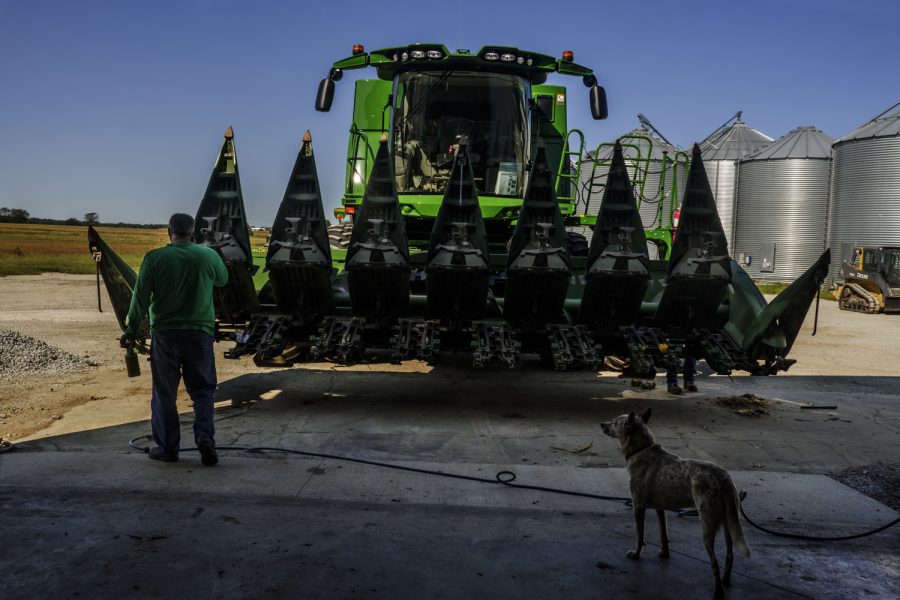
Ben Schmidt performs routine maintenance on a combine head in preparation for the upcoming harvest on Monday, Sept. 10, 2018. Schmidt grows corn and soybeans on his farm outside of Iowa City. Nick Rohlman/The Daily Iowan
As Iowa soybean farmers approach harvest season, many are more concerned about the long-term economic damage of an ongoing trade dispute with China than short-term price drops.
Rob Ewoldt, a soybean farmer near Davenport, said that when President Trump made the July announcement of trade tariffs on Ewoldt’s No. 1 buyer, China, he thought the dispute would be shorter lived.
However, Ewoldt thought he would break even or better this season because of a combination of federal aid and pre-selling his soybeans.
“When you add in government aid that is supposed to be coming our way, I’m still going to make money on soybeans. That’s me personally,” Ewoldt said. “Only because the government’s kicking in the money. That’s what makes the difference there.”
After a potential $600 million hit to Iowa’s agriculture industry was calculated, in late July, President Trump announced a $12 billion federal-aid package would be distributed to farmers across the U.S. Iowa could potentially receive $550 million, according to the Des Moines Register.
“We appreciate that [the government] realizes agriculture is important, but we would much rather have the free trade,” Ewoldt said.
Ewoldt, who lives near the Mississippi River, said 100 percent of the soybeans he grows are sent down the river and exported to other countries, leaving the entirety of his yield subject to the tax.
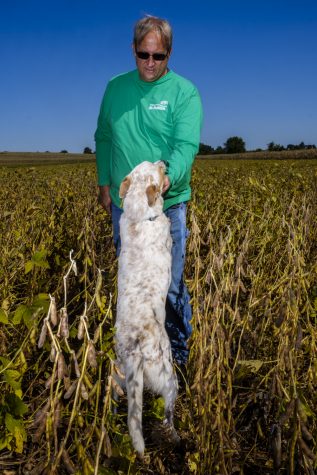
Although he dislikes Trump’s handling of the trade dispute, he said, he would likely vote for Trump again in 2020, hoping the effects of tariffs will be short-term. Ewoldt said he tended to look toward candidates who did not favor excess agriculture regulations.
He compared the tariffs to the EPA clean-water regulations proposed by the Obama administration to limit pollution. He said the extra regulations felt more burdensome and were more costly.
“In the business end, you got to go with the least of two evils,” Ewoldt said.
The Trump administration levied a tariff on about 800 Chinese products in July, and China imposed retaliatory tariffs on $34 billion worth of U.S. agricultural products, vehicles, and aquatic products. Iowa was hit particularly hard, with soybeans and pork taking the brunt of the tariffs.
To lessen the effect of the trade dispute, the U.S. Department of Agriculture announced it will provide farmers approximately $1.65 per bushel of soybeans. Iowa State University agriculture economics experts say the federal-aid package will cancel damages soybean farmers may face, but it could mean dips in the future price of land. The USDA website predicts aid will be disbursed after harvest season, in late October or early November.
“If this trade war goes on for longer than a year, we are going to have too much land for the available demand for the spring of 2019,” ISU economist Dermot Hayes said.
Mark Stutsman of Eldon C. Stutsman Inc., eastern Iowa’s largest supplier of agricultural products, retail and wholesale, said that so far, the tariffs have affected his farmer customers more than it has affected his business.
Because soybean prices had been declining for the past four years, he said, the tariffs added a new layer of uncertainty for his customers. Average yearly price per bushel of soybeans dropped from $14.13 in 2014 to $9.27 in 2016.
“In June, our customers were operating on narrow margins to begin with, so this certainly puts them in the red,” said Stutsman, who declined to give his political affiliation.
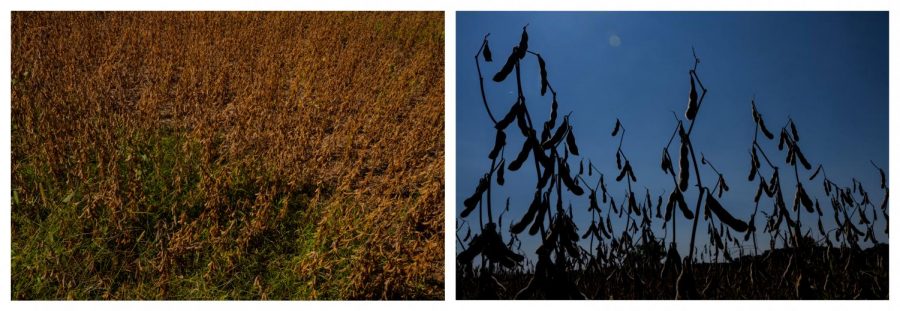
What the U.S. has previously done with China was not working, he said.
In 2017, the U.S. goods deficit with China reached $375.2 billion, according to the U.S. census. Computers and electronics were the largest U.S. imports from China, reaching $167.3 billion. In comparison, farm crops were the largest Chinese import from the U.S., reaching $15.3 billion.
“Whether you tolerate Trump or you hate Trump, none of this should have come as a surprise,” Stutsman said.
Ben Schmidt, a soybean and corn farmer in the southwest Iowa City area, said that since the buzz about the trade disputes started, he saw the market values of Iowa’s agricultural goods drop on the Chicago Board of Trade, which controls how soybeans are delivered throughout the world.
Local trade has been affected as well, he said, because farmers get paid less in Iowa City in comparison with somewhere such as Muscatine, because farmers have to pay the difference of the transportation costs when moving products.
Right now, Schmidt said, soybean farmers are having a hard time finding a home for the soybeans; the product is without a buyer.
“At this point, the export market just isn’t there,” Schmidt said.
He said he will not rely on the federal-aid package.
“We don’t understand what is totally going on in the tariff world,” Schmidt said. “Some headway with Mexico and Canada will help, but China is the No. 1 customer of soybeans.”
One of the only things he wants is the tariffs to be lifted, he said.
“The free market is the only way to trade the beans,” Schmidt said.
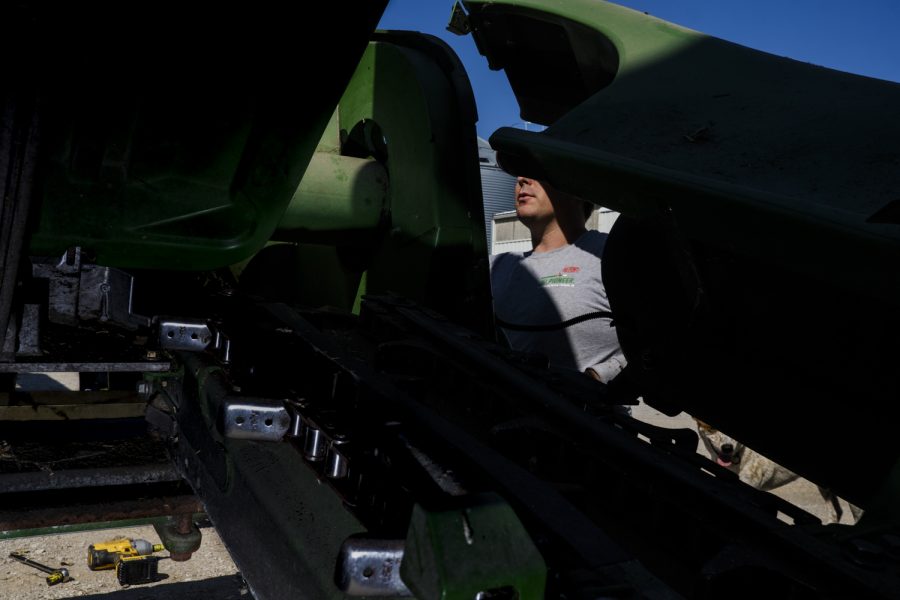
Oskaloosa farmer Mark Jackson, a former president of the Iowa Soybean Association, said through his 44 years of farming, he has become accustomed to the ups and downs of different presidential administrations’ agriculture policies.
“Trade talks tend to have a mind of their own,” he said, noting he’s experienced many drops in soybean prices unrelated to trade tariffs.
Jackson did not comment on whether he voted for Trump in 2016 but said the policies the agriculture industry supports are generally conservative.
“There are a tremendous number of regulations out there now,” Jackson said. “[Excess regulation] has a tendency to get in the way of good, proper business and sustainability protocols, because modern agriculture today does understand sustainability.”
Trade tariffs have given rural Iowa a spotlight in the gubernatorial race, with both candidates criss-crossing Iowa to hear farmers’ perspectives.
Jackson said he has worked with Gov. Kim Reynolds, a Republican seeking to be elected this November, in export efforts with the Iowa Soybean Association. He said she is a strong advocate for agriculture.
Reynolds has repeatedly condemned the trade war and has emphasized the importance of the markets remaining open so Iowa can sell products globally.
“Iowa farmers feed and fuel the world, and Gov. Reynolds will continue to advocate on their behalf whether that’s free and fair trade, supporting ethanol, or fighting against harmful rules and regulations that come out of Washington, D.C.,” Reynolds’ campaign spokesperson Pat Garrett wrote in an email to The Daily Iowan..
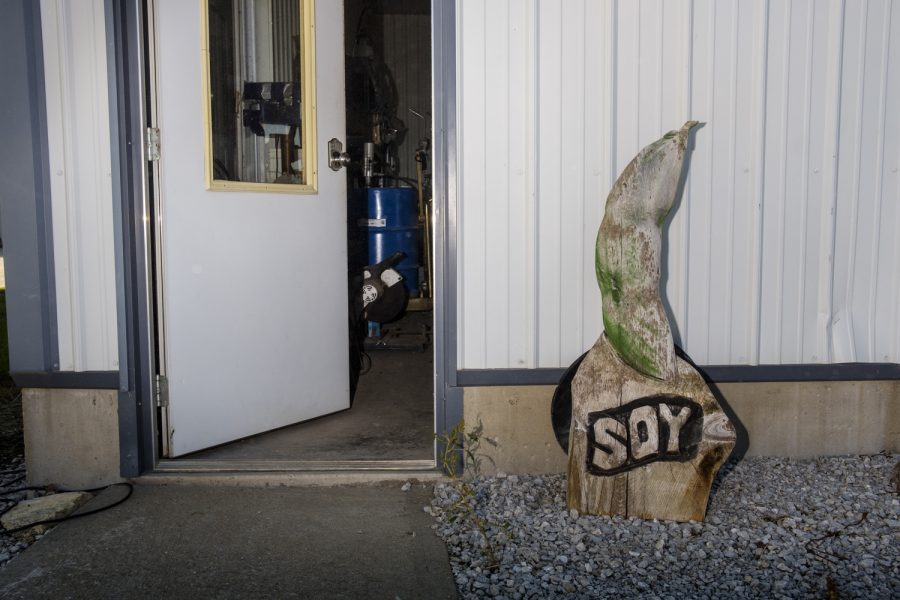
Reynolds’ opponent, Democrat Fred Hubbell, contends that Reynolds is not doing enough in putting funding behind rural outreach initiatives. He vowed to support and strengthen Iowa’s bilateral trade deals, campaign spokesperson Emilie Simons said.
Simons said Hubbell has traveled through various rural counties and has met in coffee shops, homes, farms, schools, and businesses to discuss farmers’ biggest concerns. Simons said he campaigned in Newton, Riverside, Deep River, and Coon Rapids.
“Iowa’s pork producers stand to lose $800 million over the next year, and tariffs placed on soybeans could cost Iowa’s soybean producers $772 million,” Simons wrote in an email to the DI. “Gov. Reynolds stood by as President Trump threatened this reckless trade war and refused to stand up to the president in person during his visit to Iowa last month.”
Ewoldt, the Davenport soybean farmer, said he could lose as much as $20,000 in production this year. As an eighth-generation farmer, he said, his family has weathered many storms, though it is yet to be seen how his products will ultimately fare in the trade dispute if it continues.
“It’s a little bit scary,” Ewoldt said. “I’ll be honest with you, because when we started off, we weren’t going to be that profitable this year. Then we watched a $2 drop in the value of our beans. That hurts.”
Editor’s note: this article has been updated to clarify a paraphrased quote from Hubbell campaign spokesperson Emilie Simons.


